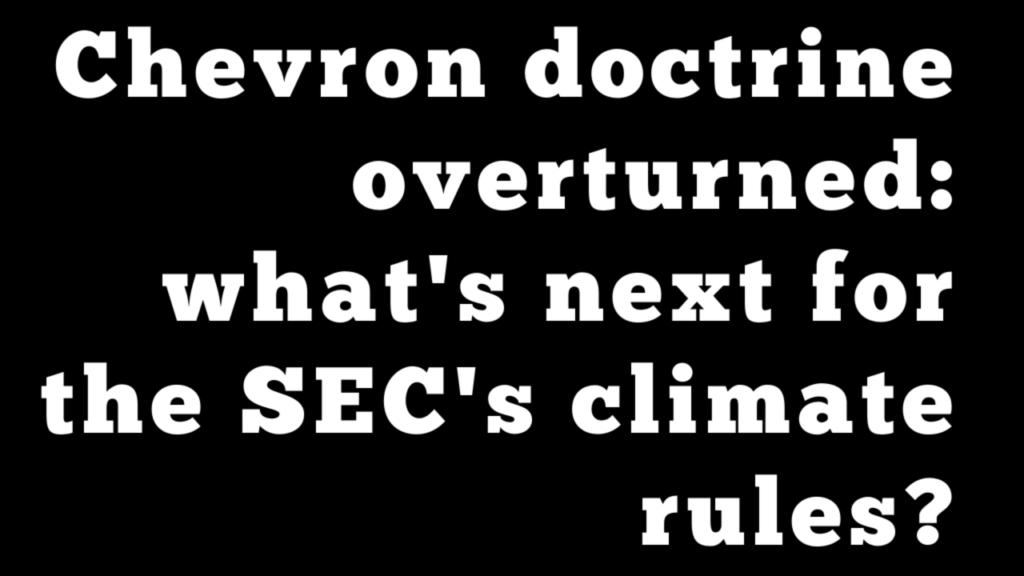Chevron doctrine overturned: what’s next for the SEC’s climate rules?

Here’s a note from Tim Mohin (also see this John Jenkins blog about whether the Chevron doctrine really changed anything to begin with – and whether that judicial deference would return post-overturning):
For 40 years, the “Chevron deference” doctrine has meant that US courts defer to federal agencies’ “reasonable” interpretations in the rules they release. Last Friday, with judges voting 6-3 along party lines, this long-running feature of federal administrative law was struck down by the Supreme Court.
The precedent was created when the oil and gas company Chevron USA challenged the EPA’s interpretation of the Clean Air Act in 1984 (Chevron U.S.A. v. Natural Resources Defense Council). Chevron argued the Act did not precisely define what constituted a “source” of air pollution. The court ruling set up a two-part test that was deferential to government agency judgment. The first part is whether Congress has spoken directly to the precise issue in question, and the second is “whether the agency’s answer is based on a permissible construction of the statute.”
Overturning this deference will have a massive impact on climate policy. Some history:
Congress has actually never passed a law specifically restricting greenhouse gas emissions. The US Environmental Protection Agency (EPA) successfully argued that the Clean Air Act mandate to protect public health justified its climate rules less than ten years ago (the 2007 decision in Massachusetts v. EPA). EPA used the deference to establish that greenhouse gasses qualify as air pollutants under the Clean Air Act based on this language in the law: “The [EPA] Administrator shall by regulation prescribe…standards applicable to the emission of any air pollutant…which in his judgment cause, or contribute to, air pollution which may reasonably be anticipated to endanger public health or welfare.”
Then, after the current conservative majority was installed, the Supreme Court has been eroding EPA’s powers. In 2022 (West Virginia v EPA), the Court limited the EPA’s options for regulating greenhouse gas emissions.
Now, this decision pulls out all the stops. Without the ability to apply scientific knowledge to interpret vague Congressional authorizations such as “air pollution which may reasonably be anticipated to endanger public health or welfare,” EPA scientists’ judgment will be second-guessed by judges who are unlikely to be experts in public health.
(Apologies for the deep dive, dear reader: I was personally involved in crafting the 1990 amendments to the Clean Air Act and an EPA employee for many years, so this one cuts close.)
Michael Burger of the Sabin Center for Climate Change Law at Columbia University said, “It (the Supreme Court ruling) certainly makes climate regulations under the Clean Air Act more susceptible to judicial reversal. It shifts the power from the agencies to the courts.”
This new reality for federal rules will likely embolden energy and other high-emissions companies to challenge EPA and other agency rules. Other agencies that could be impacted include the Securities and Exchange Commission (SEC) and its Climate Rule, which this article says is as good as dead. It could also impact a California vehicle emissions rule, which relies on an interpretation of the Clean Air Act.
However, some legal experts say the removal of the Chevron deference cuts both ways and will make it harder for Trump to remove Biden’s climate policies. A Trump-era EPA Commissioner, Hon. Andrew Wheeler, said, “Activist judges at both ends of the spectrum are going to have a little bit more leeway… It’s possible that a Republican regulation could be overturned or a Democratic regulation could be overturned.”
Plus, many of the EPA’s new rules were created with the anticipation that Chevron would be overturned. Because of these pre-installed legal protections, Manish Bapna, president of the Natural Resources Defense Council, thinks that climate rules should not be impacted, saying, “Because new climate rules don’t rely on Chevron, and because Congress, through the Inflation Reduction Act, has strengthened climate and clean energy incentives and the E.P.A.’s regulatory authority, we don’t think this court ruling will, or should, block U.S. climate progress.”
